Personal and Professional Development: Leadership Reflection Report
VerifiedAdded on 2023/01/07
|9
|2231
|62
Report
AI Summary
This report presents a reflection on personal and professional development, focusing on the analysis of leadership skills and the application of the Gibbs reflective model. The report details the experience of giving a presentation on Jack Ma's leadership style, exploring the feelings, evaluations, and analysis of the process. It highlights the development of communication and presentation skills while identifying areas for improvement, such as time management and ICT skills. The conclusion summarizes key learning points, including the importance of overcoming shyness and developing research abilities. An action plan is outlined to improve future presentations and address identified weaknesses. The report emphasizes the importance of self-evaluation and the practical application of the Gibbs model in fostering professional growth and skill development. References from various books and journals are included to support the analysis and reflection.
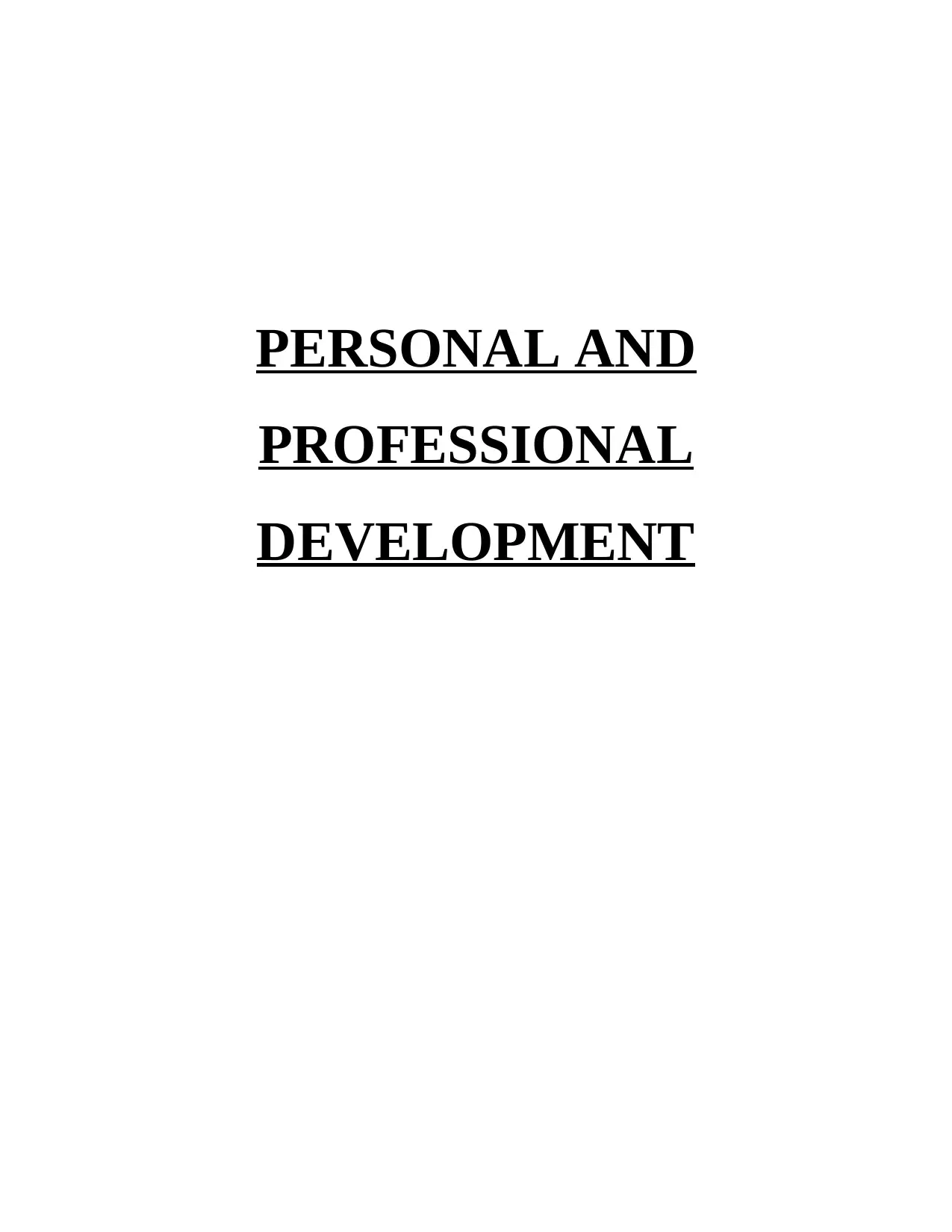
PERSONAL AND
PROFESSIONAL
DEVELOPMENT
PROFESSIONAL
DEVELOPMENT
Paraphrase This Document
Need a fresh take? Get an instant paraphrase of this document with our AI Paraphraser
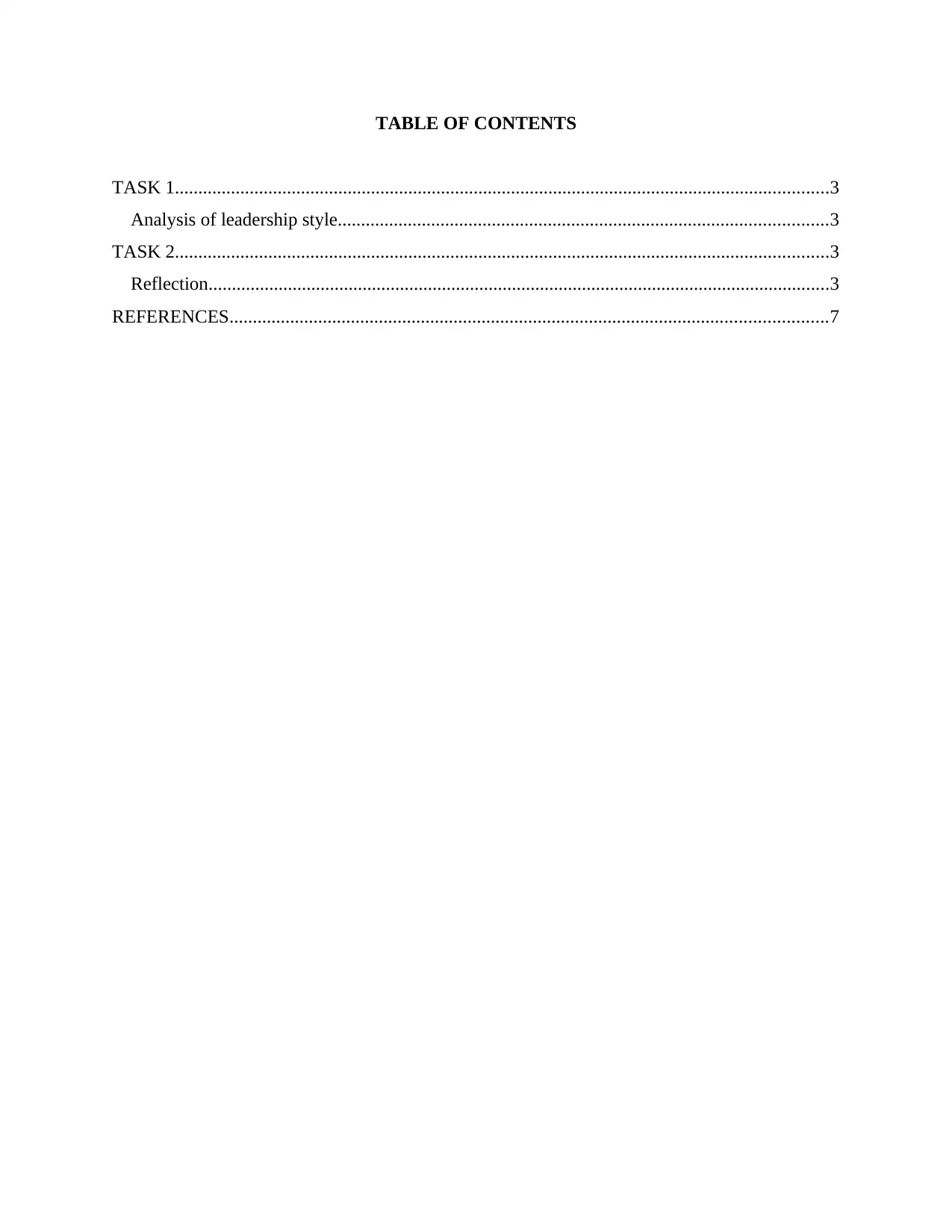
TABLE OF CONTENTS
TASK 1............................................................................................................................................3
Analysis of leadership style.........................................................................................................3
TASK 2............................................................................................................................................3
Reflection.....................................................................................................................................3
REFERENCES................................................................................................................................7
TASK 1............................................................................................................................................3
Analysis of leadership style.........................................................................................................3
TASK 2............................................................................................................................................3
Reflection.....................................................................................................................................3
REFERENCES................................................................................................................................7
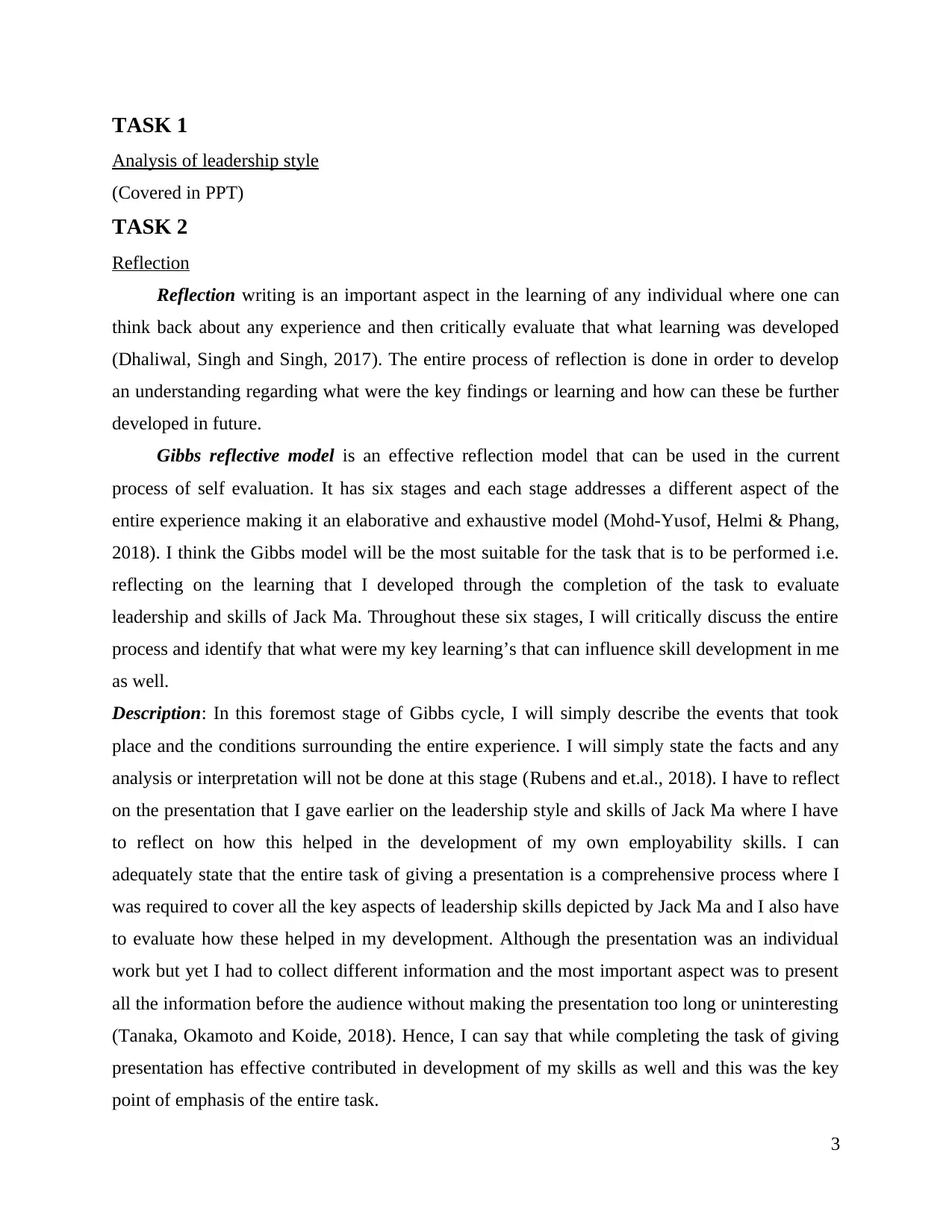
TASK 1
Analysis of leadership style
(Covered in PPT)
TASK 2
Reflection
Reflection writing is an important aspect in the learning of any individual where one can
think back about any experience and then critically evaluate that what learning was developed
(Dhaliwal, Singh and Singh, 2017). The entire process of reflection is done in order to develop
an understanding regarding what were the key findings or learning and how can these be further
developed in future.
Gibbs reflective model is an effective reflection model that can be used in the current
process of self evaluation. It has six stages and each stage addresses a different aspect of the
entire experience making it an elaborative and exhaustive model (Mohd-Yusof, Helmi & Phang,
2018). I think the Gibbs model will be the most suitable for the task that is to be performed i.e.
reflecting on the learning that I developed through the completion of the task to evaluate
leadership and skills of Jack Ma. Throughout these six stages, I will critically discuss the entire
process and identify that what were my key learning’s that can influence skill development in me
as well.
Description: In this foremost stage of Gibbs cycle, I will simply describe the events that took
place and the conditions surrounding the entire experience. I will simply state the facts and any
analysis or interpretation will not be done at this stage (Rubens and et.al., 2018). I have to reflect
on the presentation that I gave earlier on the leadership style and skills of Jack Ma where I have
to reflect on how this helped in the development of my own employability skills. I can
adequately state that the entire task of giving a presentation is a comprehensive process where I
was required to cover all the key aspects of leadership skills depicted by Jack Ma and I also have
to evaluate how these helped in my development. Although the presentation was an individual
work but yet I had to collect different information and the most important aspect was to present
all the information before the audience without making the presentation too long or uninteresting
(Tanaka, Okamoto and Koide, 2018). Hence, I can say that while completing the task of giving
presentation has effective contributed in development of my skills as well and this was the key
point of emphasis of the entire task.
3
Analysis of leadership style
(Covered in PPT)
TASK 2
Reflection
Reflection writing is an important aspect in the learning of any individual where one can
think back about any experience and then critically evaluate that what learning was developed
(Dhaliwal, Singh and Singh, 2017). The entire process of reflection is done in order to develop
an understanding regarding what were the key findings or learning and how can these be further
developed in future.
Gibbs reflective model is an effective reflection model that can be used in the current
process of self evaluation. It has six stages and each stage addresses a different aspect of the
entire experience making it an elaborative and exhaustive model (Mohd-Yusof, Helmi & Phang,
2018). I think the Gibbs model will be the most suitable for the task that is to be performed i.e.
reflecting on the learning that I developed through the completion of the task to evaluate
leadership and skills of Jack Ma. Throughout these six stages, I will critically discuss the entire
process and identify that what were my key learning’s that can influence skill development in me
as well.
Description: In this foremost stage of Gibbs cycle, I will simply describe the events that took
place and the conditions surrounding the entire experience. I will simply state the facts and any
analysis or interpretation will not be done at this stage (Rubens and et.al., 2018). I have to reflect
on the presentation that I gave earlier on the leadership style and skills of Jack Ma where I have
to reflect on how this helped in the development of my own employability skills. I can
adequately state that the entire task of giving a presentation is a comprehensive process where I
was required to cover all the key aspects of leadership skills depicted by Jack Ma and I also have
to evaluate how these helped in my development. Although the presentation was an individual
work but yet I had to collect different information and the most important aspect was to present
all the information before the audience without making the presentation too long or uninteresting
(Tanaka, Okamoto and Koide, 2018). Hence, I can say that while completing the task of giving
presentation has effective contributed in development of my skills as well and this was the key
point of emphasis of the entire task.
3
⊘ This is a preview!⊘
Do you want full access?
Subscribe today to unlock all pages.

Trusted by 1+ million students worldwide
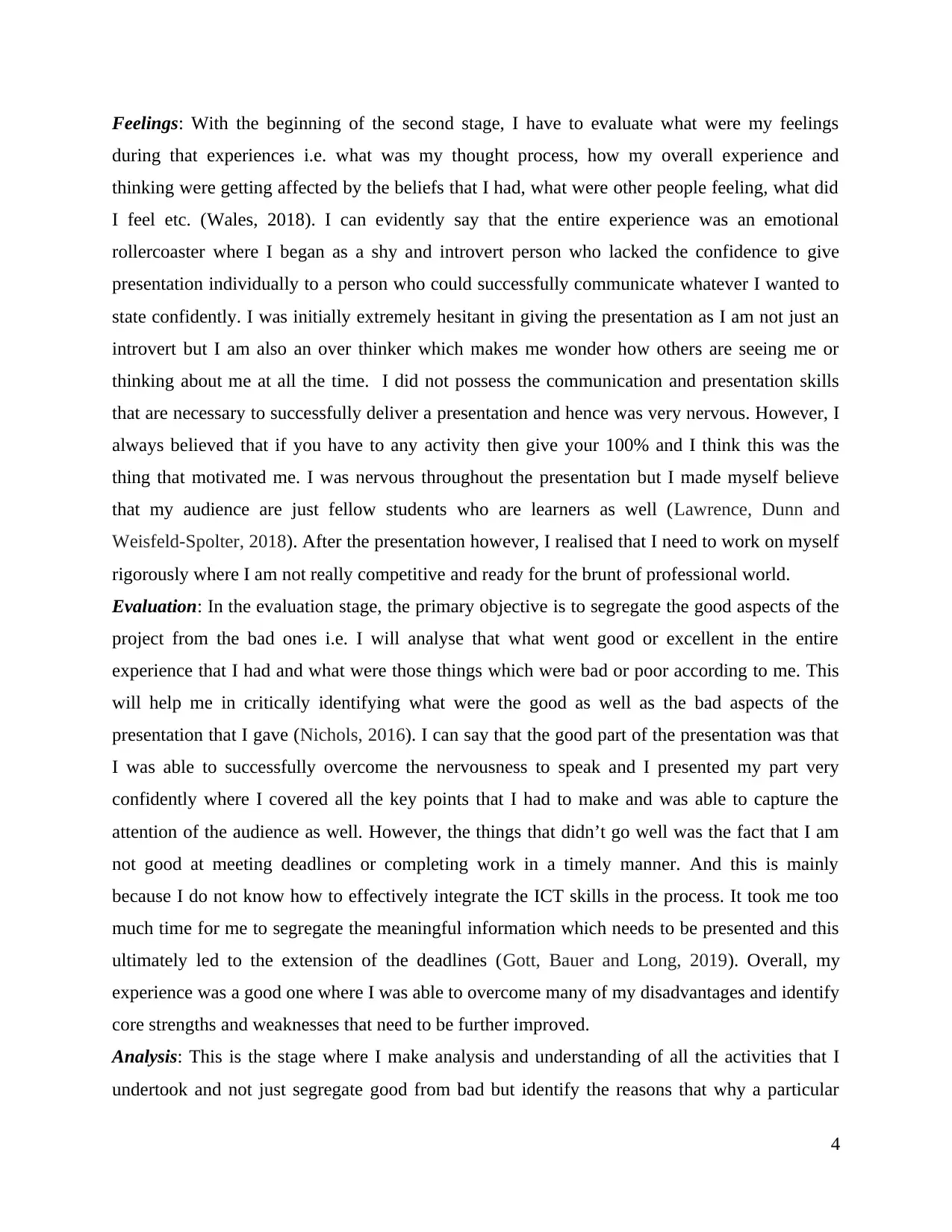
Feelings: With the beginning of the second stage, I have to evaluate what were my feelings
during that experiences i.e. what was my thought process, how my overall experience and
thinking were getting affected by the beliefs that I had, what were other people feeling, what did
I feel etc. (Wales, 2018). I can evidently say that the entire experience was an emotional
rollercoaster where I began as a shy and introvert person who lacked the confidence to give
presentation individually to a person who could successfully communicate whatever I wanted to
state confidently. I was initially extremely hesitant in giving the presentation as I am not just an
introvert but I am also an over thinker which makes me wonder how others are seeing me or
thinking about me at all the time. I did not possess the communication and presentation skills
that are necessary to successfully deliver a presentation and hence was very nervous. However, I
always believed that if you have to any activity then give your 100% and I think this was the
thing that motivated me. I was nervous throughout the presentation but I made myself believe
that my audience are just fellow students who are learners as well (Lawrence, Dunn and
Weisfeld-Spolter, 2018). After the presentation however, I realised that I need to work on myself
rigorously where I am not really competitive and ready for the brunt of professional world.
Evaluation: In the evaluation stage, the primary objective is to segregate the good aspects of the
project from the bad ones i.e. I will analyse that what went good or excellent in the entire
experience that I had and what were those things which were bad or poor according to me. This
will help me in critically identifying what were the good as well as the bad aspects of the
presentation that I gave (Nichols, 2016). I can say that the good part of the presentation was that
I was able to successfully overcome the nervousness to speak and I presented my part very
confidently where I covered all the key points that I had to make and was able to capture the
attention of the audience as well. However, the things that didn’t go well was the fact that I am
not good at meeting deadlines or completing work in a timely manner. And this is mainly
because I do not know how to effectively integrate the ICT skills in the process. It took me too
much time for me to segregate the meaningful information which needs to be presented and this
ultimately led to the extension of the deadlines (Gott, Bauer and Long, 2019). Overall, my
experience was a good one where I was able to overcome many of my disadvantages and identify
core strengths and weaknesses that need to be further improved.
Analysis: This is the stage where I make analysis and understanding of all the activities that I
undertook and not just segregate good from bad but identify the reasons that why a particular
4
during that experiences i.e. what was my thought process, how my overall experience and
thinking were getting affected by the beliefs that I had, what were other people feeling, what did
I feel etc. (Wales, 2018). I can evidently say that the entire experience was an emotional
rollercoaster where I began as a shy and introvert person who lacked the confidence to give
presentation individually to a person who could successfully communicate whatever I wanted to
state confidently. I was initially extremely hesitant in giving the presentation as I am not just an
introvert but I am also an over thinker which makes me wonder how others are seeing me or
thinking about me at all the time. I did not possess the communication and presentation skills
that are necessary to successfully deliver a presentation and hence was very nervous. However, I
always believed that if you have to any activity then give your 100% and I think this was the
thing that motivated me. I was nervous throughout the presentation but I made myself believe
that my audience are just fellow students who are learners as well (Lawrence, Dunn and
Weisfeld-Spolter, 2018). After the presentation however, I realised that I need to work on myself
rigorously where I am not really competitive and ready for the brunt of professional world.
Evaluation: In the evaluation stage, the primary objective is to segregate the good aspects of the
project from the bad ones i.e. I will analyse that what went good or excellent in the entire
experience that I had and what were those things which were bad or poor according to me. This
will help me in critically identifying what were the good as well as the bad aspects of the
presentation that I gave (Nichols, 2016). I can say that the good part of the presentation was that
I was able to successfully overcome the nervousness to speak and I presented my part very
confidently where I covered all the key points that I had to make and was able to capture the
attention of the audience as well. However, the things that didn’t go well was the fact that I am
not good at meeting deadlines or completing work in a timely manner. And this is mainly
because I do not know how to effectively integrate the ICT skills in the process. It took me too
much time for me to segregate the meaningful information which needs to be presented and this
ultimately led to the extension of the deadlines (Gott, Bauer and Long, 2019). Overall, my
experience was a good one where I was able to overcome many of my disadvantages and identify
core strengths and weaknesses that need to be further improved.
Analysis: This is the stage where I make analysis and understanding of all the activities that I
undertook and not just segregate good from bad but identify the reasons that why a particular
4
Paraphrase This Document
Need a fresh take? Get an instant paraphrase of this document with our AI Paraphraser
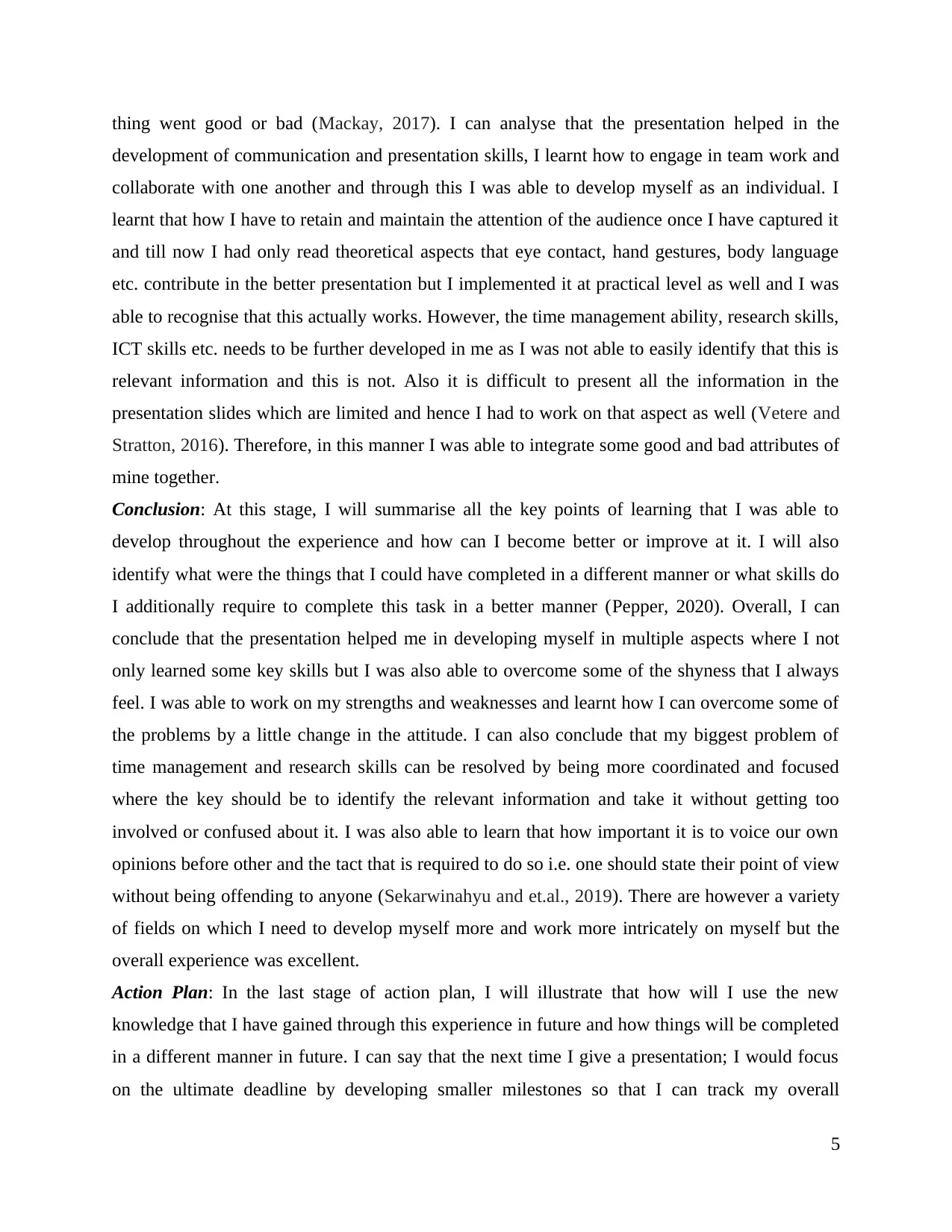
thing went good or bad (Mackay, 2017). I can analyse that the presentation helped in the
development of communication and presentation skills, I learnt how to engage in team work and
collaborate with one another and through this I was able to develop myself as an individual. I
learnt that how I have to retain and maintain the attention of the audience once I have captured it
and till now I had only read theoretical aspects that eye contact, hand gestures, body language
etc. contribute in the better presentation but I implemented it at practical level as well and I was
able to recognise that this actually works. However, the time management ability, research skills,
ICT skills etc. needs to be further developed in me as I was not able to easily identify that this is
relevant information and this is not. Also it is difficult to present all the information in the
presentation slides which are limited and hence I had to work on that aspect as well (Vetere and
Stratton, 2016). Therefore, in this manner I was able to integrate some good and bad attributes of
mine together.
Conclusion: At this stage, I will summarise all the key points of learning that I was able to
develop throughout the experience and how can I become better or improve at it. I will also
identify what were the things that I could have completed in a different manner or what skills do
I additionally require to complete this task in a better manner (Pepper, 2020). Overall, I can
conclude that the presentation helped me in developing myself in multiple aspects where I not
only learned some key skills but I was also able to overcome some of the shyness that I always
feel. I was able to work on my strengths and weaknesses and learnt how I can overcome some of
the problems by a little change in the attitude. I can also conclude that my biggest problem of
time management and research skills can be resolved by being more coordinated and focused
where the key should be to identify the relevant information and take it without getting too
involved or confused about it. I was also able to learn that how important it is to voice our own
opinions before other and the tact that is required to do so i.e. one should state their point of view
without being offending to anyone (Sekarwinahyu and et.al., 2019). There are however a variety
of fields on which I need to develop myself more and work more intricately on myself but the
overall experience was excellent.
Action Plan: In the last stage of action plan, I will illustrate that how will I use the new
knowledge that I have gained through this experience in future and how things will be completed
in a different manner in future. I can say that the next time I give a presentation; I would focus
on the ultimate deadline by developing smaller milestones so that I can track my overall
5
development of communication and presentation skills, I learnt how to engage in team work and
collaborate with one another and through this I was able to develop myself as an individual. I
learnt that how I have to retain and maintain the attention of the audience once I have captured it
and till now I had only read theoretical aspects that eye contact, hand gestures, body language
etc. contribute in the better presentation but I implemented it at practical level as well and I was
able to recognise that this actually works. However, the time management ability, research skills,
ICT skills etc. needs to be further developed in me as I was not able to easily identify that this is
relevant information and this is not. Also it is difficult to present all the information in the
presentation slides which are limited and hence I had to work on that aspect as well (Vetere and
Stratton, 2016). Therefore, in this manner I was able to integrate some good and bad attributes of
mine together.
Conclusion: At this stage, I will summarise all the key points of learning that I was able to
develop throughout the experience and how can I become better or improve at it. I will also
identify what were the things that I could have completed in a different manner or what skills do
I additionally require to complete this task in a better manner (Pepper, 2020). Overall, I can
conclude that the presentation helped me in developing myself in multiple aspects where I not
only learned some key skills but I was also able to overcome some of the shyness that I always
feel. I was able to work on my strengths and weaknesses and learnt how I can overcome some of
the problems by a little change in the attitude. I can also conclude that my biggest problem of
time management and research skills can be resolved by being more coordinated and focused
where the key should be to identify the relevant information and take it without getting too
involved or confused about it. I was also able to learn that how important it is to voice our own
opinions before other and the tact that is required to do so i.e. one should state their point of view
without being offending to anyone (Sekarwinahyu and et.al., 2019). There are however a variety
of fields on which I need to develop myself more and work more intricately on myself but the
overall experience was excellent.
Action Plan: In the last stage of action plan, I will illustrate that how will I use the new
knowledge that I have gained through this experience in future and how things will be completed
in a different manner in future. I can say that the next time I give a presentation; I would focus
on the ultimate deadline by developing smaller milestones so that I can track my overall
5
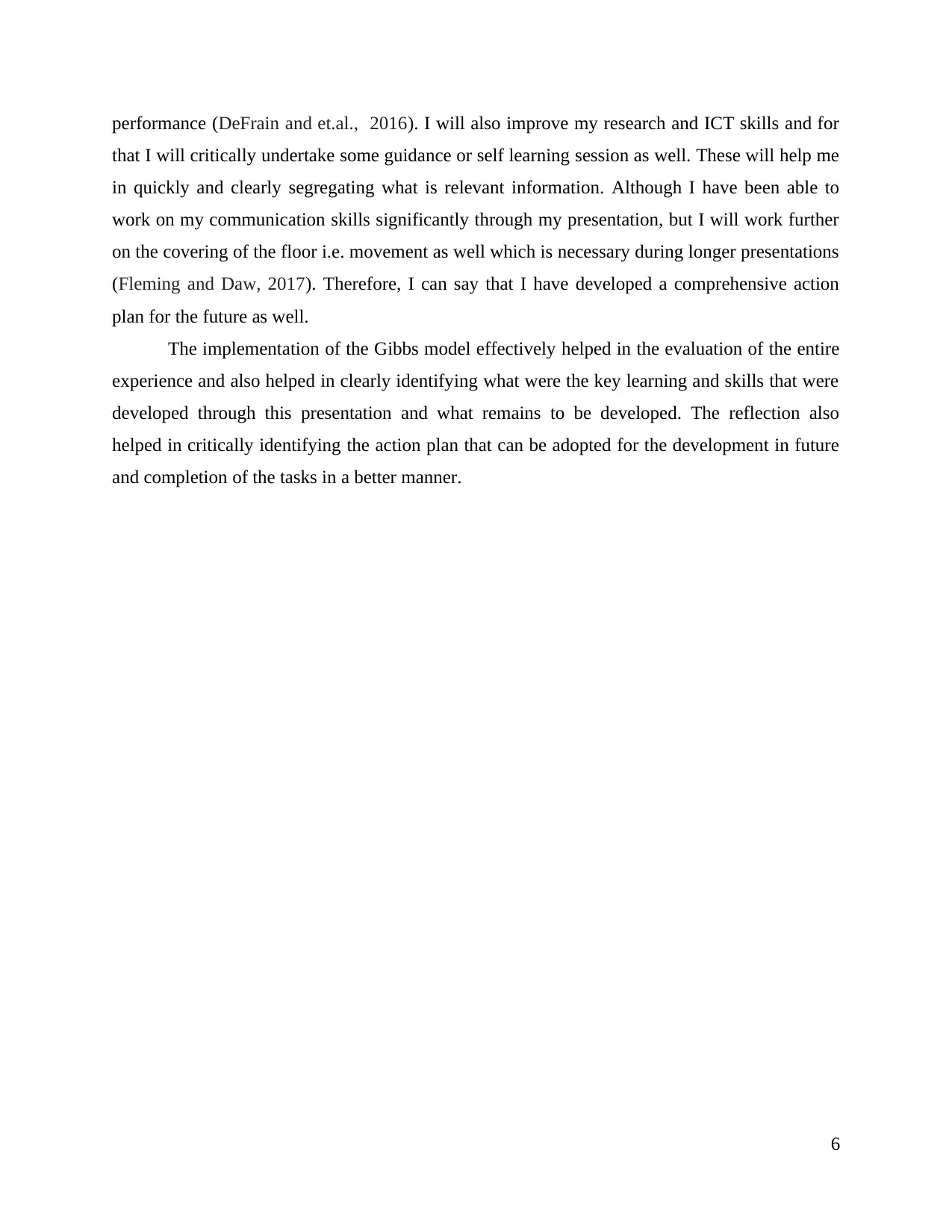
performance (DeFrain and et.al., 2016). I will also improve my research and ICT skills and for
that I will critically undertake some guidance or self learning session as well. These will help me
in quickly and clearly segregating what is relevant information. Although I have been able to
work on my communication skills significantly through my presentation, but I will work further
on the covering of the floor i.e. movement as well which is necessary during longer presentations
(Fleming and Daw, 2017). Therefore, I can say that I have developed a comprehensive action
plan for the future as well.
The implementation of the Gibbs model effectively helped in the evaluation of the entire
experience and also helped in clearly identifying what were the key learning and skills that were
developed through this presentation and what remains to be developed. The reflection also
helped in critically identifying the action plan that can be adopted for the development in future
and completion of the tasks in a better manner.
6
that I will critically undertake some guidance or self learning session as well. These will help me
in quickly and clearly segregating what is relevant information. Although I have been able to
work on my communication skills significantly through my presentation, but I will work further
on the covering of the floor i.e. movement as well which is necessary during longer presentations
(Fleming and Daw, 2017). Therefore, I can say that I have developed a comprehensive action
plan for the future as well.
The implementation of the Gibbs model effectively helped in the evaluation of the entire
experience and also helped in clearly identifying what were the key learning and skills that were
developed through this presentation and what remains to be developed. The reflection also
helped in critically identifying the action plan that can be adopted for the development in future
and completion of the tasks in a better manner.
6
⊘ This is a preview!⊘
Do you want full access?
Subscribe today to unlock all pages.

Trusted by 1+ million students worldwide
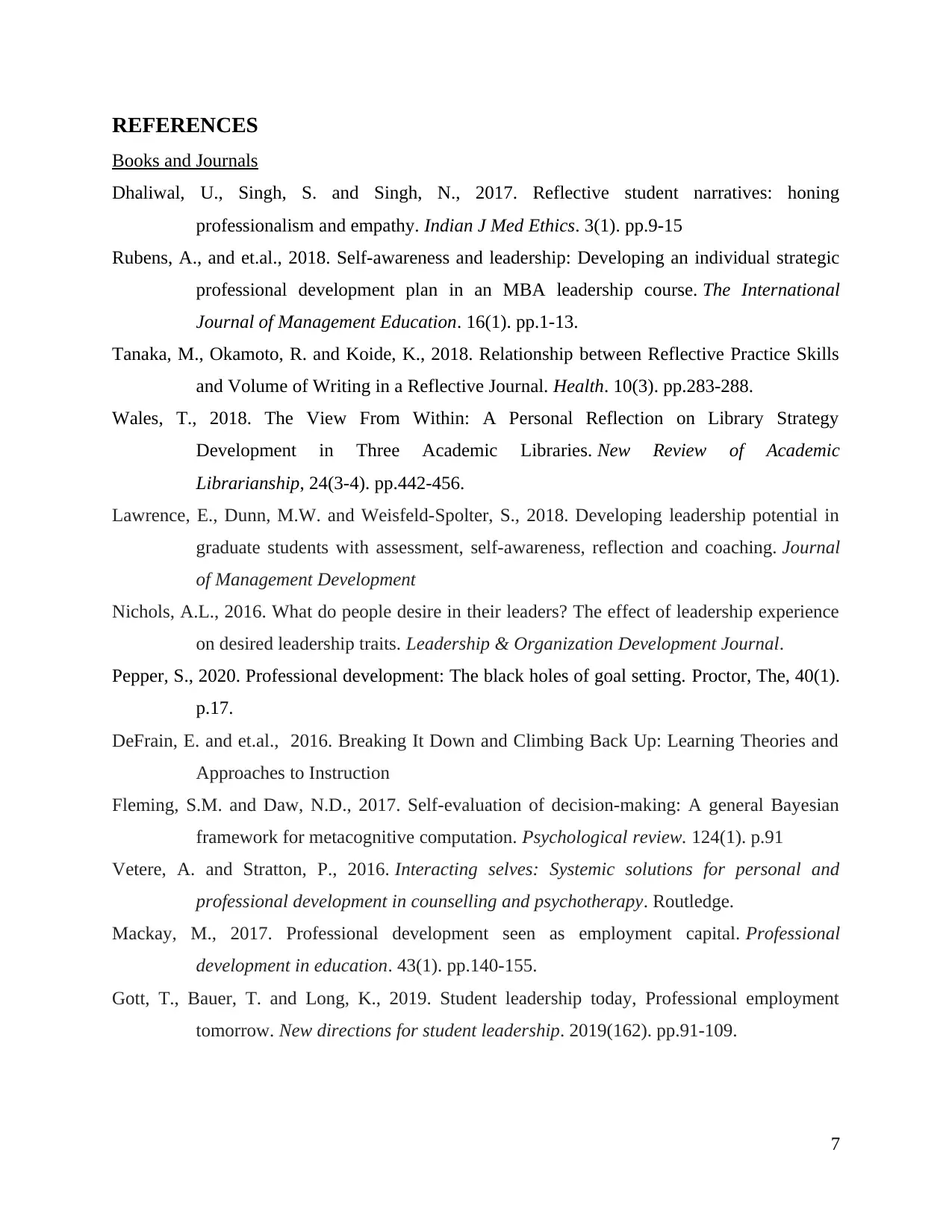
REFERENCES
Books and Journals
Dhaliwal, U., Singh, S. and Singh, N., 2017. Reflective student narratives: honing
professionalism and empathy. Indian J Med Ethics. 3(1). pp.9-15
Rubens, A., and et.al., 2018. Self-awareness and leadership: Developing an individual strategic
professional development plan in an MBA leadership course. The International
Journal of Management Education. 16(1). pp.1-13.
Tanaka, M., Okamoto, R. and Koide, K., 2018. Relationship between Reflective Practice Skills
and Volume of Writing in a Reflective Journal. Health. 10(3). pp.283-288.
Wales, T., 2018. The View From Within: A Personal Reflection on Library Strategy
Development in Three Academic Libraries. New Review of Academic
Librarianship, 24(3-4). pp.442-456.
Lawrence, E., Dunn, M.W. and Weisfeld-Spolter, S., 2018. Developing leadership potential in
graduate students with assessment, self-awareness, reflection and coaching. Journal
of Management Development
Nichols, A.L., 2016. What do people desire in their leaders? The effect of leadership experience
on desired leadership traits. Leadership & Organization Development Journal.
Pepper, S., 2020. Professional development: The black holes of goal setting. Proctor, The, 40(1).
p.17.
DeFrain, E. and et.al., 2016. Breaking It Down and Climbing Back Up: Learning Theories and
Approaches to Instruction
Fleming, S.M. and Daw, N.D., 2017. Self-evaluation of decision-making: A general Bayesian
framework for metacognitive computation. Psychological review. 124(1). p.91
Vetere, A. and Stratton, P., 2016. Interacting selves: Systemic solutions for personal and
professional development in counselling and psychotherapy. Routledge.
Mackay, M., 2017. Professional development seen as employment capital. Professional
development in education. 43(1). pp.140-155.
Gott, T., Bauer, T. and Long, K., 2019. Student leadership today, Professional employment
tomorrow. New directions for student leadership. 2019(162). pp.91-109.
7
Books and Journals
Dhaliwal, U., Singh, S. and Singh, N., 2017. Reflective student narratives: honing
professionalism and empathy. Indian J Med Ethics. 3(1). pp.9-15
Rubens, A., and et.al., 2018. Self-awareness and leadership: Developing an individual strategic
professional development plan in an MBA leadership course. The International
Journal of Management Education. 16(1). pp.1-13.
Tanaka, M., Okamoto, R. and Koide, K., 2018. Relationship between Reflective Practice Skills
and Volume of Writing in a Reflective Journal. Health. 10(3). pp.283-288.
Wales, T., 2018. The View From Within: A Personal Reflection on Library Strategy
Development in Three Academic Libraries. New Review of Academic
Librarianship, 24(3-4). pp.442-456.
Lawrence, E., Dunn, M.W. and Weisfeld-Spolter, S., 2018. Developing leadership potential in
graduate students with assessment, self-awareness, reflection and coaching. Journal
of Management Development
Nichols, A.L., 2016. What do people desire in their leaders? The effect of leadership experience
on desired leadership traits. Leadership & Organization Development Journal.
Pepper, S., 2020. Professional development: The black holes of goal setting. Proctor, The, 40(1).
p.17.
DeFrain, E. and et.al., 2016. Breaking It Down and Climbing Back Up: Learning Theories and
Approaches to Instruction
Fleming, S.M. and Daw, N.D., 2017. Self-evaluation of decision-making: A general Bayesian
framework for metacognitive computation. Psychological review. 124(1). p.91
Vetere, A. and Stratton, P., 2016. Interacting selves: Systemic solutions for personal and
professional development in counselling and psychotherapy. Routledge.
Mackay, M., 2017. Professional development seen as employment capital. Professional
development in education. 43(1). pp.140-155.
Gott, T., Bauer, T. and Long, K., 2019. Student leadership today, Professional employment
tomorrow. New directions for student leadership. 2019(162). pp.91-109.
7
Paraphrase This Document
Need a fresh take? Get an instant paraphrase of this document with our AI Paraphraser
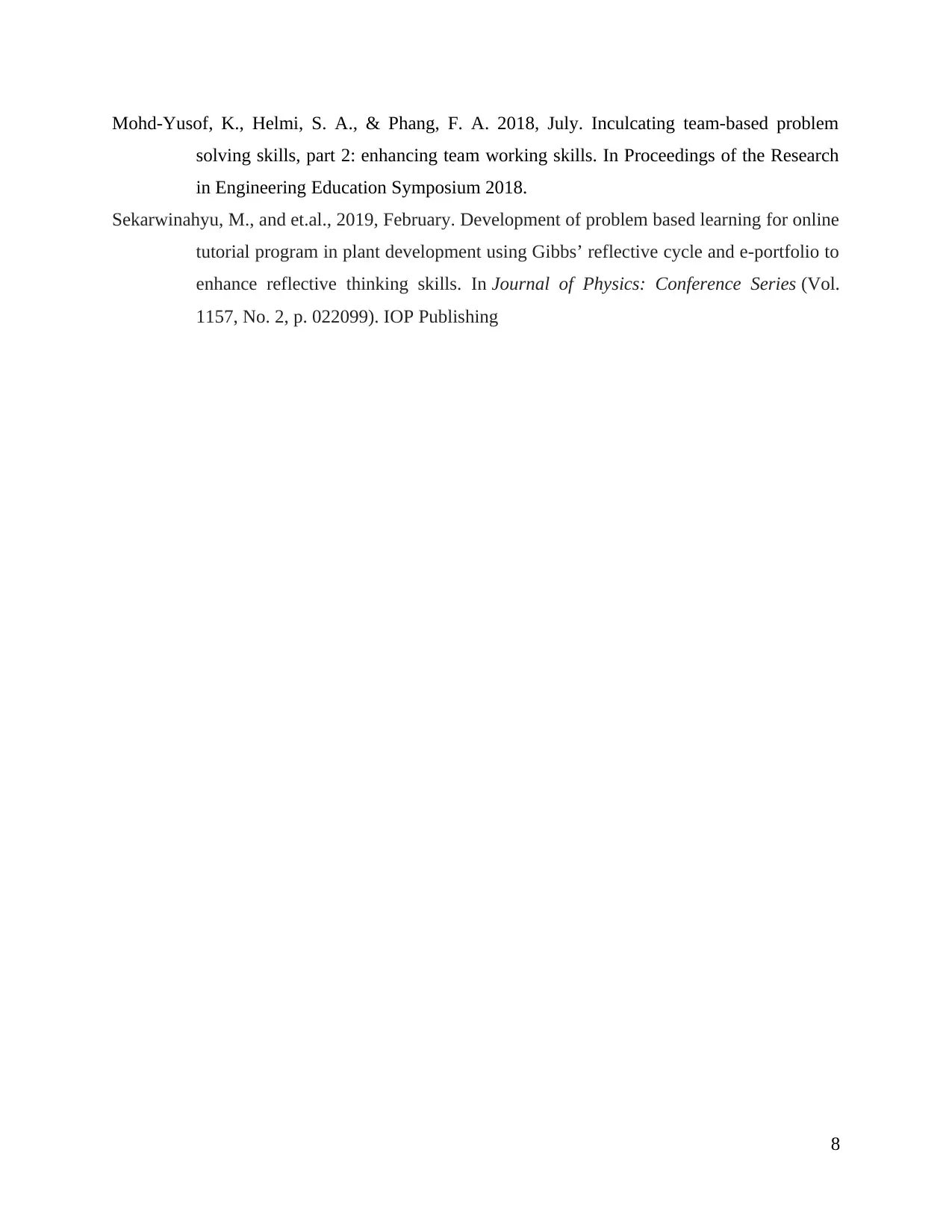
Mohd-Yusof, K., Helmi, S. A., & Phang, F. A. 2018, July. Inculcating team-based problem
solving skills, part 2: enhancing team working skills. In Proceedings of the Research
in Engineering Education Symposium 2018.
Sekarwinahyu, M., and et.al., 2019, February. Development of problem based learning for online
tutorial program in plant development using Gibbs’ reflective cycle and e-portfolio to
enhance reflective thinking skills. In Journal of Physics: Conference Series (Vol.
1157, No. 2, p. 022099). IOP Publishing
8
solving skills, part 2: enhancing team working skills. In Proceedings of the Research
in Engineering Education Symposium 2018.
Sekarwinahyu, M., and et.al., 2019, February. Development of problem based learning for online
tutorial program in plant development using Gibbs’ reflective cycle and e-portfolio to
enhance reflective thinking skills. In Journal of Physics: Conference Series (Vol.
1157, No. 2, p. 022099). IOP Publishing
8

9
⊘ This is a preview!⊘
Do you want full access?
Subscribe today to unlock all pages.

Trusted by 1+ million students worldwide
1 out of 9
Related Documents
Your All-in-One AI-Powered Toolkit for Academic Success.
+13062052269
info@desklib.com
Available 24*7 on WhatsApp / Email
![[object Object]](/_next/static/media/star-bottom.7253800d.svg)
Unlock your academic potential
Copyright © 2020–2026 A2Z Services. All Rights Reserved. Developed and managed by ZUCOL.





